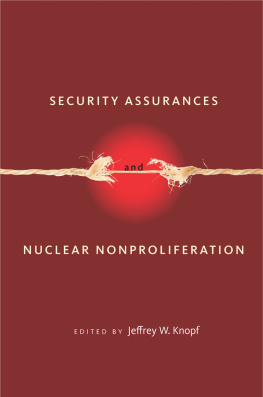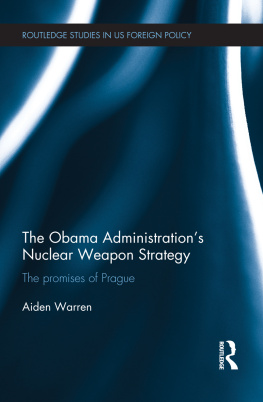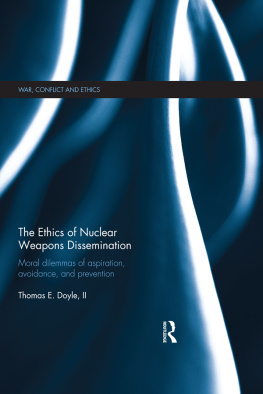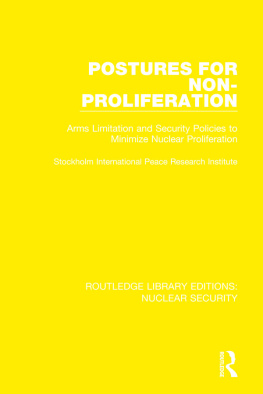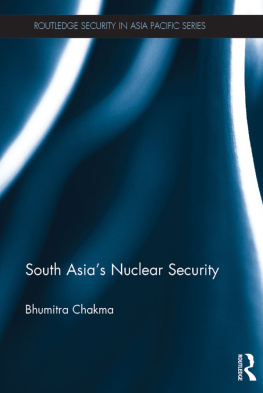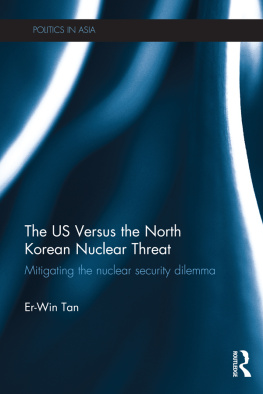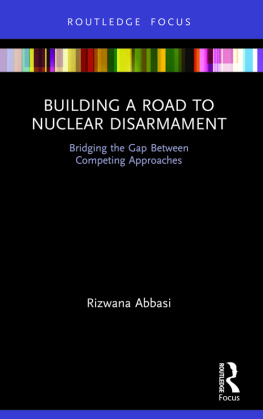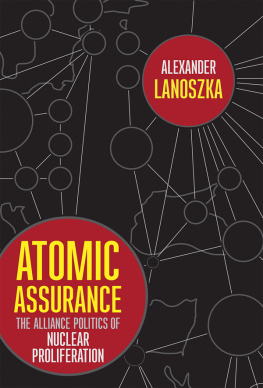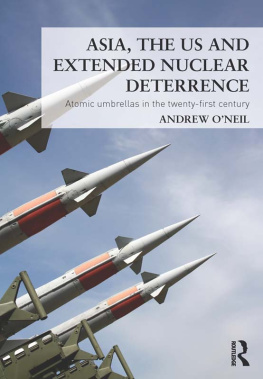Stanford University Press
Stanford, California
2012 by the Board of Trustees of the Leland Stanford Junior University.
All rights reserved.
No part of this book may be reproduced or transmitted in any form or by any means, electronic or mechanical, including photocopying and recording, or in any information storage or retrieval system without the prior written permission of Stanford University Press.
Printed in the United States of America on acid-free, archival-quality paper
Library of Congress Cataloging-in-Publication Data
Security assurances and nuclear nonproliferation / edited by Jeffrey W. Knopf.
pages cm.
Includes bibliographical references and index.
ISBN 978-0-8047-7827-5 (cloth : alk. paper)
ISBN 978-0-8047-8491-7 (e-book)
1. Nuclear nonproliferation. 2. National security. 3. Security, International. I. Knopf, Jeffrey W., editor of compilation.
JZ5675.S44 2012
327.1'747dc23 2011052155
Typeset at Stanford University Press in 10/14 Minion
Special discounts for bulk quantities of Stanford Security Studies are available to corporations, professional associations, and other organizations. For details and discount information, contact the special sales department of Stanford University Press.
Tel: (650) 736-1782, Fax: (650) 736-1784
Preface and Acknowledgments
This project emerged when two sources of inspiration came together. A course I teach provided the first spark. For several years, I have taught a graduate seminar that covers deterrence and other strategies whose aim is to influence other actors in international politics. The course includes a module on the topic of reassurance. Reassurance is a strategy in which one state tries to convince another state that it harbors no aggressive intentions toward it; the goal of reassurance is to reduce the chances of an unintended conflict between two states with an adversarial relationship. In past years, whenever it came time to update my syllabus, I could usually find relevant recent publications on all the other strategies covered by the course. In contrast, I found little new research that added to our understanding of strategies of assurance or reassurance, and I came to see my existing assigned readings as increasingly dated. In the back of my mind, I began thinking I should develop a research project to advance both theory and empirical research in this subject area.
Fortunately, this vague impulse soon encountered a second key spark. Dr. Michael O. Wheeler, then director of the U.S. Defense Threat Reduction Agencys Advanced Systems and Concepts Office (DTRA-ASCO), gave a talk at the Naval Postgraduate School in which he identified security assurances as a critical topic in need of further research. Dr. Wheeler had in mind the use of security assurances as a tool for discouraging states from seeking to acquire nuclear weapons. As part of the efforts that have been made to prevent proliferation, existing nuclear-armed states have offered both negative assurances that they will not use their nuclear weapons to threaten non-nuclear states and positive commitments to assist states that are so threatened.
This is a different context than that addressed by the academic literature on reassurance. Yet it struck me that the two topics had important elements in common, suggested by the fact that both employed the root term assurance. Both strategies share a core idea about how to influence others: both reassurance and security assurances seek to do so by alleviating some source of insecurity on the part of the recipient. By making the recipient feel less threatened, all versions of assurance aim to moderate its behavior in some way. In the realm of nuclear nonproliferation, security assurances have been intended to reduce recipients concerns about being threatened by nuclear weapons, thereby making them feel less need to acquire a nuclear arsenal of their own. I decided that a study of the impact of security assurances could make a double contribution. First, it would help us ascertain whether assurances have been effective in slowing the spread of nuclear weapons and identify ways to make them more effective. Second, it could contribute to our understanding more generally of assurance as a type of influence strategy and bring renewed attention to the value of assurance as one option in the policy toolkit.
I approached Dr. Wheeler with my idea, and with his encouragement developed it into a research proposal to DTRA-ASCO. The proposal received funding, and this book is the result. The research agenda was one that would be beyond the capacity of any one individual, at least in any reasonable length of time, so it was clear from the outset that this project would have to be a team effort. I am very pleased and honored that the other authors included in this volume accepted my invitation to be part of the project.
The project began with an authors workshop at the Cheyenne Mountain Resort in Colorado Springs, Colorado, in August 2009. I provided an initial theory paper ahead of time to help guide the other paper writers in their research. Most important, the introductory paper included a preliminary list of hypotheses about factors that might affect whether assurances are effective, and I asked the authors of several country case studies to assess these hypotheses in their papers. At the workshop, all the paper writers received feedback from each other as well as assigned discussants. Based on feedback from the workshop plus subsequent comments from me and two external reviewers, all of the papers have gone through several rounds of revision to produce the chapters published here.
For any collective endeavor such as this, the editor and authors depend upon invaluable assistance from many people and organizations. To start with, I thank DTRA-ASCO for providing the funding that made this research possible. The opinions expressed in this book are, however, those of the authors and are not intended to represent the positions or policies of DTRA or the U.S. government. Many individuals also contributed to this project in various ways. First and foremost, I thank Mike Wheeler for his encouragement and support of the project and the valuable guidance he offered. I also thank former or current DTRA employees Kerry Kartchner, Jeffrey Fields, Dave Hamon, and Mike Keifer, as well as Jim Smith of the U.S. Air Force Academy, for helping facilitate the initial workshop and participating in its discussions. Several academic colleagues participated in the workshop and offered valuable inputs, and I express my gratitude to Bruno Tertrais, Etel Solingen, Michael Kraig, Jungsoo Kim, Chris Twomey, and Erik Dahl for their participation and the insights they provided. I also wish to acknowledge two anonymous external reviewers for Stanford University Press. They provided thoughtful and detailed comments on all the chapters, and this volume benefited from their very professional and constructive feedback.
I also owe a special debt of gratitude to Meghan Holcomb, who handled nearly all the logistics and administrative tasks for the project. On several occasions, she helped prevent the workshop from falling through due to some snafu, and she also helped me, as P.I., to navigate the tricky waters of federal government contracting rules. In addition, I thank Brenda Lyons and Colleen Pace of Cheyenne Mountain Resort for helping make our workshop there a pleasant experience. Geoffrey Burn and Jessica Walsh of Stanford University Press have also been a joy to work with, and I deeply appreciate all their efforts to facilitate the process from initial proposal to finished book.

